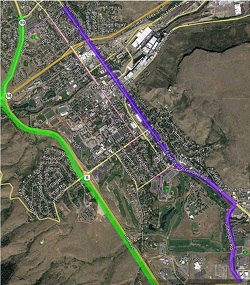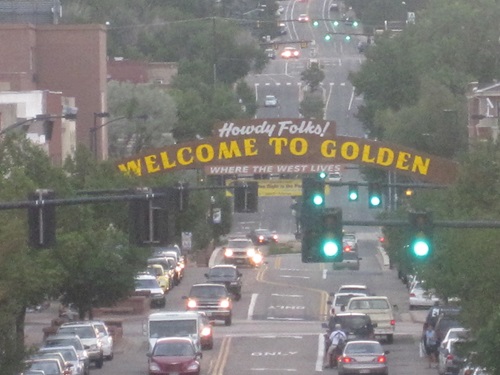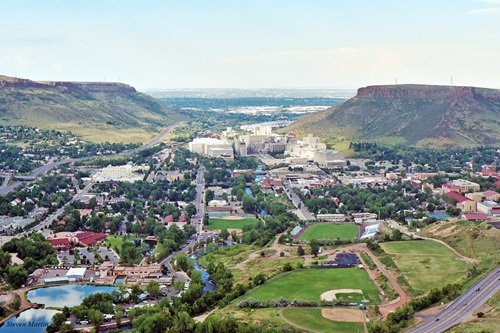
Fast, affordable Internet access for all.

Golden, Colorado has struck a new right-of-way agreement with Google Fiber that should expedite the competitive delivery of affordable fiber to the city of 20,000.
The deal gives Google Fiber non-exclusive access to public right-of-way to build a commercial broadband network, though it delivers no guarantee of uniform access across the entire city.
In a memo to the Golden City Council, Chief Innovation and Technology Officer Jiles McCoy said the city’s new agreement “would act as a template for any future companies wishing to build broadband services in the Golden right of way.”
The move comes after years of discussion in the city as to how to improve local broadband competition, reduce prices, and expand affordable access.
In 2016, Golden residents voted to opt out of a now defunct state law, ghost written by regional broadband monopolies, restricting the construction and operation of community owned and operated broadband networks. Last year Colorado leaders finally eliminated the law completely, opening the door to greater expansion of community-owned networks.

In 2019 the city completed a feasibility study showing that the construction of a full city-owned fiber network would cost $37 million. Instead of tackling the entire project at once, advisers recommended the city proceed in phases, beginning with the construction of a $3.8 million, 10.5 mile fiber ring connecting key community anchor institutions.
But when asked about the fiber ring, Golden officials told ILSR they’ve been taking a more incremental approach that leans heavily on public-private partnerships and private funding.
“Golden hasn’t constructed a $3.8M fiber ring,” McCoy told ILSR. “We have done some much smaller scale fiber infrastructure construction along Ford St, but we don’t have a fiber ring for the City. Our goal is to one day complete the construction of such a ring, which will significantly improve the resilience of the City’s communications infrastructure, but immediate concerns are building connectivity for City facilities that currently aren’t directly attached to the City network.”
In 2022, the City published a RFI soliciting partners and plans for a commercial citywide broadband implementation. While providers like Ting, ALLO, and Highline responded to the inquiry, the city says it struggled to find a partner that would allow it to retain full ownership of the finished network.
As a result, the city continues to strike patchwork deals with private providers to move the ball steadily forward.

“We look to co-build with entities as they request permits to do work in the City rights of way,” McCoy told us. “Our last 2 efforts–which constitutes the work along Ford Street–were with Jefferson County Schools and Verizon. This type of cooperation significantly reduces the expense to the City for the fiber infrastructure construction.”
The partnership with Google Fiber is just the latest chapter of this phased, PPP-heavy focus.
“The City has been negotiating this agreement for months and believes this version is the best version available from Google at this point in time and any additional requests might not be able to be incorporated,” McCoy stated in a memo.
Google will pay a fee per linear foot to the city of Golden, which will also be allowed to co-locate equipment and install city conduit simultaneously with Google construction activity.
“Our intention, coming into the community of Golden, is to serve that community as widely as possible,” George Manthos, Google Fiber’s head of technical operations for Colorado, told the Golden Transcript.
The new partnership continues a period of renewed vitality for Google Fiber after the company appeared close to collapse in recent years. Parent company Alphabet effectively halted all Google Fiber expansion back in 2016, when the company laid off numerous employees and canceled service installations for many waiting customers.

But Alphabet has shown renewed motivation in the last few years, expanding access into numerous markets across Utah, Colorado, Idaho, Arizona, Nebraska, and Idaho. The company generally avoids more urban, competitive markets, focusing instead on public-private partnerships in markets that have seen a profound lack of broadband competition.
Local surveys conducted by the city of Golden show that 90% of residents consider broadband to be a “necessary utility” and not a luxury service, while 85% of city residents support the city’s quest to build its own broadband network if private providers refuse to uniformly provide affordable access.
Golden’s agreement with Google doesn’t solve all of the city’s affordable broadband problems, but city officials say it’s another small step in the right direction, and the added competition should nudge local providers CenturyLink (Lumen) and Comcast to try harder.
Inline image of Welcome to Golden sign courtesy of Wikimedia Commons, Attribution-ShareAlike 3.0 Unported
Inline image of aerial view of Golden courtesy of Steven Martin, Attribution-NonCommercial-NoDerivs 2.0 Generic
